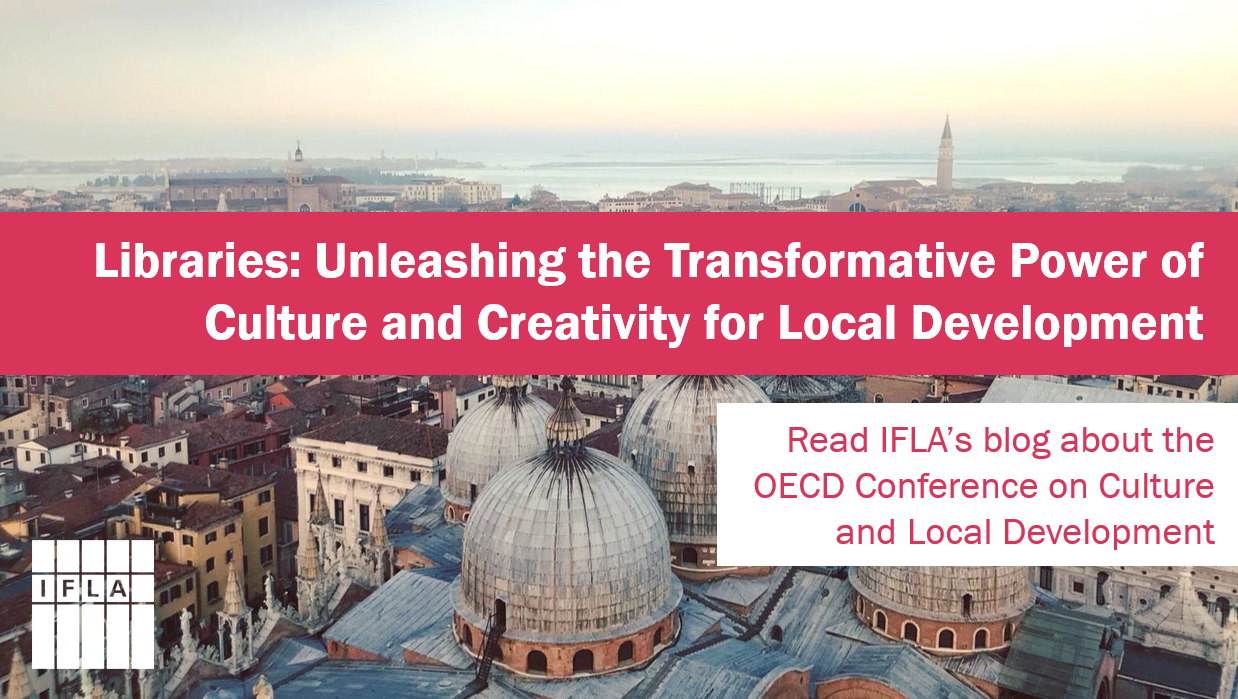
IFLA attended the first ever OECD conference examining the links between culture and local growth. The conference took place in Venice, an ideal venue to discuss the importance of culture and cultural heritage, and the newly launched OECD Guide: Culture and Local Development: Maximising the Impact.
Culture is currently on the agenda of cities, regions and territories. Whereas the focus globally is often only on access in itself, for example via the internet, taking a local perspective allows for more focus on the impact of culture, and in particular, its contribution to building social capital.
Over 300 participants from NGOs, cultural institutions, the creative business and decision makers joined the discussion on how local government can realise the potential of culture as a lever for local development.
“Culture can positively impact communities and foster mutual understanding… culture is intrinsically human, with inherent value for all”
Xing Qu, Deputy Director-General of UNESCO
Libraries: Good for Society
One theme that kept reappearing during the conference is the influence that access to culture has on citizens’ well-being, in other words, the level of happiness!
Libraries and cultural institutions undoubtably have a powerful impact on their communities. They support initiatives in a variety of fields and further development by helping people get information they need to access economic opportunity, gender equality, quality education, improve their health and give a sense of belonging.
“Culture is about storytelling. It’s about using data opening up multilateral perspectives on the same reality… It’s not about collections, it’s about connections”
Jeffrey Schnapp, Director of the metaLAB at Harvard
Though most agree that access to culture has a great impact on our life, we still struggle to find tools that can help measure the impact and demonstrate its value. In 2005 Denmark published its study on the value of public libraries, with three roles of the library highlighted as the most important:
- The role as culture and information deliver
- The role as safeguarding cultural heritage
- The role as creator for creative and social development
The Danish study was followed by a number of other European countries identifying the many benefits a community receive from its local libraries concluding that libraries have a positive effect on its community and counter many economic and social challenges.
Earlier this year, Europeana launched its Impact Playbook, helping cultural heritage institutions around the world establish and analyse the impact of their activities. And now, with the growing interest in the role played by cultural activities in local development the OECD has launched the Guide: Culture and Local Development: Maximising the Impact.
This is not to say that this work is easy. Every society is different, and its history must be considered when measuring cultural impact. Nonetheless, it seems that, increasingly, all societies can unite around the belief that culture can transform cities.
Moving Up a Gear on Measuring the Impact of Culture
With the launch of the Guide, the OECD announced that they are commitment to strengthening the role culture can play in creating a better society. The OECD has also incorporated access to culture into their high-profile well-being framework, understanding that access to culture is key for social cohesion and local development.
They have furthermore started cooperation with UNESCO and the European Commission, pledging to work for all cultural institutions, libraries included
Libraries increase cultural participation and in IFLA we are looking forward to working with the OECD on future projects, putting libraries on the political agenda, and making sure that their impact is not only seen, but with the right set of data, can be measured as well.